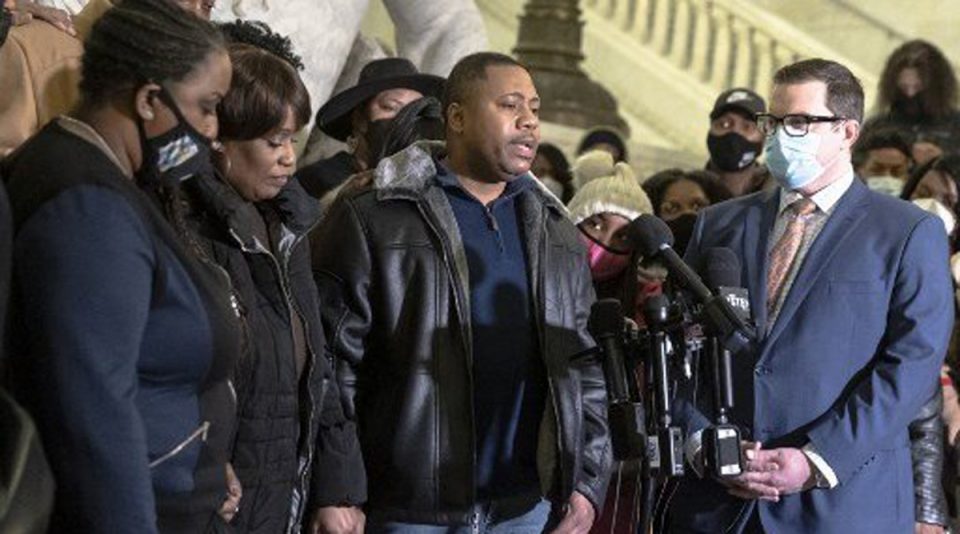Andre Locke and Karen Wells, Amir Locke’s parents, hold hands as Andre speaks during a press conference at City Hall in Minneapolis, Minnesota on February 4, 2022. Authorities in the US city of Minneapolis, where George Floyd was murdered in 2020, published body-cam video Thursday showing the police shooting of a 22-year-old African American man.
According to the police, Amir Locke was shot on Wednesday by officers who were executing a search warrant on the apartment he was in, after Locke pulled a gun from beneath a blanket.
The parents of a young Black man shot dead by police said Friday that Minneapolis officers “executed” their son and gave him no chance of survival.
Authorities in the northern US city, still reeling from the police murder of George Floyd in 2020, said Amir Locke, 22, was shot Wednesday by officers carrying out a search warrant on the apartment he was in.
In the video, an officer uses a key to unlock the door and then a group of officers enter while shouting “Police, search warrant!”
Locke, who was on a couch, starts to rise from beneath a blanket, with a gun in his hand, when police fire.
The total time between the officers’ entrance and the shots fired was less than ten seconds.
Locke was pronounced dead at the hospital.
“A mother should never have to see her child executed in that type of manner,” said Locke’s mother, Karen Wells, during a press conference, adding she would fight until her son “gets justice.”
Locke’s father, Andre Locke, said he watched the video with “disbelief and anger.”
He described his son, who he stressed had no criminal record and held a gun permit, as a “deep sleeper.”
“He did what any reasonable, law-abiding citizen would do, white or Black,” Locke said.
He said police could have done “anything differently,” including ordering his son to drop his weapon before opening fire.
“It seemed that he didn’t have a chance,” Locke said.
– ‘Locke’s life mattered’ –
Locke’s death has reopened the wounds caused by the killing of Floyd in May 2020, when white ex-Minneapolis police officer Derek Chauvin knelt on his neck for nearly nine minutes.
To ease tensions now, Minnesota state attorney general Keith Ellison promised to conduct a “fair and thorough” investigation of the events.
“Amir Locke’s life mattered,” he said, alluding to the Black Lives Matter movement.
Without predicting the outcome of the investigation, Minnesota’s Democratic governor Tim Walz said the circumstances of Locke’s death “illustrate the need for further reform” on the police force beyond the changes made after Floyd’s death, particularly the execution of search warrants.
The search warrant at the heart of the tragedy had not named Locke but said he was related to a suspect in a homicide investigation in the neighbouring city of Saint Paul.
The warrant allowed officers to enter unannounced, according to Minneapolis police chief Amelia Huffman, speaking to MPR radio.
These so-called “no-knock” warrants have been at the centre of several cases of police violence, including the shooting in March 2020 of Breonna Taylor, whose death along with Floyd’s sparked massive national antiracism protests the summer of that year.
Minnesota has restricted the use of no-knock warrants since the protests.
And on Friday Minneapolis Mayor Jacob Frey announced an immediate moratorium on such warrants while the city reviews the policy.
“No matter what information comes to light, it won’t change the fact that Amir Locke’s life was cut short,” Frey said in a statement.
“To ensure the safety of both the public and officers until a new policy is crafted, I’m issuing a moratorium on both the request and execution of such warrants in Minneapolis,” he added.
Locke’s family has retained lawyer Ben Crump, who has represented multiple Black victims of police violence, including Floyd and Taylor’s families.
“No-knock raids… continue to take the lives of innocent Black people,” Crump said.
Locke had bought a gun because he was a delivery driver and wanted to be able to protect himself, according to the attorney.
“African Americans, like any other American citizen, (have) a right to the Second Amendment,” said Crump, referring to the US constitutional right to bear arms.




